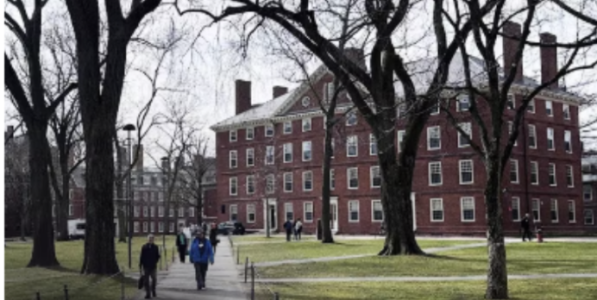Harvard risks billions by refusing Trump administration’s latest move
- Replies 4
One of the nation’s most prestigious institutions is in the middle of a high-stakes standoff.
Billions in federal funding could vanish, but the university isn’t backing down.
The move has sparked a national conversation—because what’s at stake goes far beyond money.
In doing so, the school is potentially putting nearly $9 billion in federal funding on the line.
The demands included ending diversity, equity, and inclusion programs.

They also called for merit-based admissions, cooperation with immigration enforcement, and major changes to campus governance.
President Alan Garber responded with a defiant letter. He wrote that Harvard “will not surrender its independence or relinquish its constitutional rights.”
According to the administration, Harvard had “failed to live up to both the intellectual and civil rights conditions that justify federal investment.”
The proposal included sweeping changes—from hiring practices to curriculum oversight—and “audits” to ensure viewpoint diversity.
Garber argued that the demands go too far. He said they infringe on First Amendment rights and exceed the federal government’s power under Title VI.
In his words, “No government—regardless of which party is in power—should dictate what private universities can teach, whom they can admit and hire, and which areas of study and inquiry they can pursue.”
The fight has moved to the courts. Two faculty groups have filed a lawsuit to block the administration from making funding conditional on political or policy changes.
They argue the administration is using federal money to suppress academic freedom and disfavored speech.
The lawsuit seeks an emergency order to prevent what it calls an “existential ‘gun to the head’ for universities.”
“These sweeping yet indeterminate demands... overtly seek to impose on Harvard University political views and policy preferences,” the suit states.
Harvard’s decision contrasts with how some peer institutions have responded.
Columbia University, for example, agreed to the administration’s terms after its funding was suspended amid campus protests.
Federal investigations are also underway at Cornell University and Northwestern University.
The administration has already halted over $1 billion in funding to Cornell and $790 million to Northwestern.
More like this:
 What’s your take on Harvard’s stance? Should universities stand their ground—even at a massive financial cost? Join the conversation in the comments below and share your thoughts on academic freedom, government policy, and the future of higher education.
What’s your take on Harvard’s stance? Should universities stand their ground—even at a massive financial cost? Join the conversation in the comments below and share your thoughts on academic freedom, government policy, and the future of higher education.
Billions in federal funding could vanish, but the university isn’t backing down.
The move has sparked a national conversation—because what’s at stake goes far beyond money.
Harvard University challenges Trump administration demands
Harvard University has openly rejected a set of demands from the Trump administration.In doing so, the school is potentially putting nearly $9 billion in federal funding on the line.
The demands included ending diversity, equity, and inclusion programs.

Harvard University has openly rejected a set of demands from the Trump administration. Image source: NBC News / YouTube
They also called for merit-based admissions, cooperation with immigration enforcement, and major changes to campus governance.
President Alan Garber responded with a defiant letter. He wrote that Harvard “will not surrender its independence or relinquish its constitutional rights.”
What’s in the administration’s proposal—and why Harvard refused
According to the administration, Harvard had “failed to live up to both the intellectual and civil rights conditions that justify federal investment.”
The proposal included sweeping changes—from hiring practices to curriculum oversight—and “audits” to ensure viewpoint diversity.
Garber argued that the demands go too far. He said they infringe on First Amendment rights and exceed the federal government’s power under Title VI.
In his words, “No government—regardless of which party is in power—should dictate what private universities can teach, whom they can admit and hire, and which areas of study and inquiry they can pursue.”
Faculty take legal action to stop funding threats
The fight has moved to the courts. Two faculty groups have filed a lawsuit to block the administration from making funding conditional on political or policy changes.
They argue the administration is using federal money to suppress academic freedom and disfavored speech.
The lawsuit seeks an emergency order to prevent what it calls an “existential ‘gun to the head’ for universities.”
“These sweeping yet indeterminate demands... overtly seek to impose on Harvard University political views and policy preferences,” the suit states.
Other universities under pressure—some choose compliance
Harvard’s decision contrasts with how some peer institutions have responded.
Columbia University, for example, agreed to the administration’s terms after its funding was suspended amid campus protests.
Federal investigations are also underway at Cornell University and Northwestern University.
The administration has already halted over $1 billion in funding to Cornell and $790 million to Northwestern.
More like this:
- Trump teases the possibility of another political decision–"I'm not done yet."
- Trump launches his "Gold Card" with a familiar flair
Key Takeaways
- Harvard University has rejected the Trump administration's demands which could lead to the loss of billions in federal funding.
- The administration's demands included an end to diversity programs, merit-based admissions, and compliance with immigration authorities.
- Harvard University President Alan Garber stated the demands would violate the institution's First Amendment rights and exceed the government's statutory authority.
- Faculty members have filed a lawsuit to block the administration's attempts to cut funding, arguing it undermines free speech and academic inquiry.






